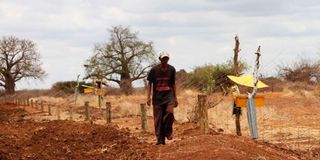Electric fence to solve human-elephant conflict

What you need to know:
- Tsavo Trust, a non-governmental organisation that runs Kamungi Conservancy, is mitigating human-wildlife conflict in the marginalised region bordering Tsavo East National Park by fencing off homesteads.
- Under the plan tailored to address food security by keeping off wild animals that raid on crops and predate on livestock, 10 per cent of an individual’s land is fenced off using a solar-powered electric fence.
Marauding elephants have impoverished agricultural communities bordering Tsavo East National Park for decades. This season, however, dozens of farmers in Mtito Andei, Makueni County expect bumper harvest, all thanks to a solar-powered electric fence project.
"We expect to fill our granaries with maize and cowpeas,” said Mr Phillip Muli, a peasant farmer in Ngiluni Village while showing Healthy Nation around flourishing cowpeas in his plot.
Mr Muli is among the beneficiaries of the fence designed to conserve wildlife and guarantee food security in the arid region, which is prone to invasion by jumbos.
Tsavo Trust, a non-governmental organisation that runs Kamungi Conservancy, is mitigating human-wildlife conflict in the marginalised region bordering Tsavo East National Park by fencing off homesteads. Under the plan tailored to address food security by keeping off wild animals that raid on crops and predate on livestock, 10 per cent of an individual’s land is fenced off using a solar-powered electric fence.
"The other part is left to make it accessible for transient small wildlife such as antelopes and for livestock to graze. This idea has both the marginal environment and the landowner’s subsistence needs in mind. The innovative 10 per cent fencing is part of an even bigger plan to mitigate human-wildlife conflict in the region,” said Mr Richard Moller, the Tsavo Trust chief executive officer.
At the height of the elephant's menace last year, a rogue elephant trampled a man to death in Ngiluni Village, throwing the sleepy neighbourhood into shock. The wild animals also disrupted schooling in the region, prompting a concerted outcry from residents and leaders. The problem did not ease even after the Kenya Wildlife Service enlisted rangers from its Problematic Animals Management Unit, set up a mobile outpost, and increased patrols in the affected region.
“Some 1,693 elephants strayed into farmlands bordering Tsavo East National Park between January and November last year. This translates to more than 120 elephants straying into farmlands every month,” Mr Moller said.
To solve the problem, Tsavo Trust partnered with Makueni County government in installing a 93-kilometer solar-powered elephant exclusion fence.
“After the first phase of fencing was completed in November last year, we had only 12 cases of elephants that strayed into farms in December. This means the human-elephant conflict has reduced by 90 per cent,” Mr Moller said during the commissioning of the fence. The head of KWS in the county Constance Mwasho exuded confidence in ending the elephants' menace.





